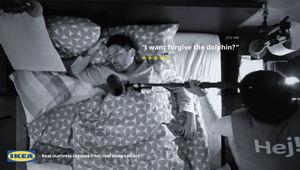
How the YWCA Used an NHL Legend to Expose the Rate of Domestic Violence-Based Concussions

According to recent calculations by the YWCA, for every NHL concussion, it’s estimated that more than 7,000 women in Canada suffer the same injury as a result of violence by an intimate partner. Take a moment to let that sink in. There are 5.8-6.1 concussions per 100 games in that league, and this statistic only applies to a single country. In short, it’s a serious issue which, traditionally, has not been spoken about nearly enough.
To change this, YWCA Metro Vancvouer called on creative agency partners Rethink to spark a discussion. However, rather than just lead off with the prompt that intimate partner-based violence is common - which might not leave a lasting impression - the two needed to reframe it in a memorable fashion. To this end, former NHL professional player Trevor Linden was brought on board to deliver a PSA that, along with hockey-oriented sound design, sounded a lot like him sharing his personal experience of dealing with concussions… Until it was revealed that it was never his story to begin with.
LBB’s Josh Neufeldt sat down with Rethink partner, executive creative director Morgan Tierney, and YWCA director of marketing, communications and advocacy Amy Juschka to explore how this twist was the perfect way to reframe an often taboo point of discussion.
LBB> What was the brief, and what immediate ideas came to mind?
Amy> When we came across this [concussion] statistic, it stopped us in our tracks. We knew our first priority had to be getting an awareness campaign out to grab the attention of the country. Seeing as Rethink has been our beloved partner for over a decade, and has a proven track record of being able to capture attention on important issues, we got straight to it.
We asked Rethink to wake Canadians up to the prevalence of brain injuries from domestic violence, and their long-term impacts. Knowing that concussions in sports have had tons of media attention for years - which has prompted incredible change - it was time to get the news about domestic violence and concussions in the spotlight, so it can begin to affect similar change.
Morgan> We knew we had to add context to the statistic, so people could truly understand just how staggering the numbers were. In this case, hockey made for the perfect comparison point.
LBB> The fact that for every NHL concussion, more than 7,000 women in Canada suffer the same injury as a result of violence by an intimate partner is very serious. How did you come to learn this, and what was the research process like?
Amy> We worked closely with our partners at SOAR (Supporting Survivors of Abuse and Brain Injury through Research) project, which is a multi-disciplinary, program of research that explores the incidence and effects of brain injury in women survivors of intimate partner violence (IPV). The calculation referenced data from the CDC’s National Intimate Partner and Sexual Violence Survey (2017), Statistics Canada (2022), the Family and Community Health journal (2011), and the Canadian Medical Association Journal (1997-2004), ensuring we could accurately show our calculations and present the findings publicly for this campaign.
Of course, learning the statistics was shocking and devastating, but it only further motivated us to ensure Canadians were aware so it could be a catalyst for change.

LBB> And what made the NHL the perfect comparison point to ground this statistic?
Morgan> We knew that it can be difficult to judge the value of something in isolation. So, comparing a well-known cause of concussions, hockey, to a shocking and overlooked cause of concussions, IPV, was the right way to address the need for support and action. We also knew we needed to reach a large audience with our message, and hockey fans in Canada are a huge population of people who may not have been reached by previous messaging.
Amy> Over the past decade, sports has dominated the concussion conversation, prompting incredible change like new medical protocols, equipment, lawsuits, funding, mental health
support, and much more. It was the perfect opportunity to expand that spotlight to include IPV. We chose to feature the NHL, knowing hockey is such a beloved sport to Canadians, and hoped that it would come with a built-in audience that would pay attention.
LBB> The accompanying spot is poignant. How did you get Trevor Linden on board, what made him the right choice for the task, and what was working with him like?
Morgan> Finding the right talent was a key part of this campaign. For a start it was crucial that the talent be recognisable to the audience, so that they could form a preconceived idea of what he was talking about - it’s what made the misdirect possible. Not only that, but the talent also needed to be a current or former NHL player who was also able to carry themselves with integrity and respect, have no past discretions, and ideally, have a passion for giving back. As a former Vancouver Canucks captain and NHLPA president, as well as an avid mental health advocate, Trevor fit the bill perfectly.
LBB> Who directed the spot, and what was the shooting experience like?
Morgan> Lindsay Siu directed the spot. As is the case with all our YWCA projects, we look to work with women if we can, but also, given that this is a women’s story, a female director made a lot of sense. Lindsay is a talented photographer and director based out of Vancouver, who was extremely passionate about the project and cause.
As for the shooting experience, the whole process was a true team effort. Trevor was so kind and generous with his time, ensuring we got everything we needed. It was really powerful to see it come to life.
LBB> The switch at the end to reveal the story of a person facing domestic abuse was super memorable! How did this aspect of the spot come to pass, and how did you use subtle details to enhance this reveal?
Morgan> In sports, concussions happen on prime time live TV with millions of people watching. We wanted to draw parallels to those publicised injuries as a reminder of what’s happening every day behind closed doors. To make the misdirect land, we had to ensure that the story rang true when read from either perspective.
Beyond this, we always sweat the details on shoots, and try to elevate our work with craft. From the audible hockey sounds to the concussion-like visual effects treatment, every piece helped strengthen the misdirect. The team is proud of the simplicity of the idea and the conversations and actions that have come from its response!

LBB> Do you have any memorable lessons learned from the making of this new campaign?
Morgan> People will pay attention if you can put the message in the context of something they are already interested in!
Amy> Engaging the right spokesperson is key to a campaign like this. Trevor Linden is a Canadian icon and household name, so when he speaks, people listen. Trevor’s willingness to be interviewed and act as a spokesperson beyond the PSA was also key to the campaign’s success - it kept the issue in the media and engaged people who may have otherwise tuned out.
LBB> With that in mind, what has the initial response been like?
Morgan> The response has been incredible! As Karen Mason, the co-founder and director of community practice for SOAR put it when talking to CBC, ‘In two days since this campaign was released… the issue of brain injury and IPV has had a broader scope of audience than it ever has in the eight years I’ve been working on this issue’.
LBB> Is there anything you’d like to say about supporting women facing intimate partner violence?
Morgan> Sport has dominated the conversation around concussions for the past decade, leading to greater protocols and treatment for many athletes. But it’s time to shift the spotlight. We’re calling for more research on intimate partner violence and traumatic brain injury, increased education among front-line responders, better pathways for concussion treatment and direct investments in services for people who have experienced concussion as a result of intimate partner violence.
LBB> How does this campaign fit into YWCA’s brand strategy for 2023 and beyond?
Amy> We have a broad scope of services and goals at the YWCA, but one of our biggest priorities for this year is addressing gender-based violence. We have transition housing, legal services, childcare, and advocacy work for policy, and this campaign is just our starting point. We are working towards ending gender-based violence and getting the research and resources in place.

LBB> As a whole, how can Canadians help you in this fight against gender-based violence and IPV?
Amy> Canadians can help by learning more and becoming aware of how prevalent this issue is, right in each of our own cities. We, as an organisation, are calling for more research on intimate partner violence and traumatic brain injury, increased education among front-line responders, better pathways for treatment, and direct investments in services for people who have experienced a concussion as a result of IPV.
LBB> Is there anything you’d like to add?
Morgan> YWCA Metro Vancouver provides practical and emotional support for self-identifying women who are experiencing violence or abuse in an intimate relationship. If you or someone you know is in immediate danger or seriously injured, call 911. YWCA has the resources and helplines available to you if you are in a crisis.
Amy> There is still a perception that IPV is a private matter between two partners, rather than a reflection of deeply ingrained societal norms and systemic inequity. Campaigns like this help reframe it as a public health emergency that requires a government response.
The intersection of IPV and concussions is even more taboo because we know women face real threats by coming forward about their experiences, whether that’s increased violence by their intimate partner, or losing custody of their children (a real threat given the ongoing symptoms of concussions). Highlighting this issue is critical, because it may give more women the courage to come forward and talk about their experiences. Putting concussions on the radar of the people who may support survivors - like doctors, first-responders and shelter workers - also means they know what to look out for, and can better support women experiencing it.















